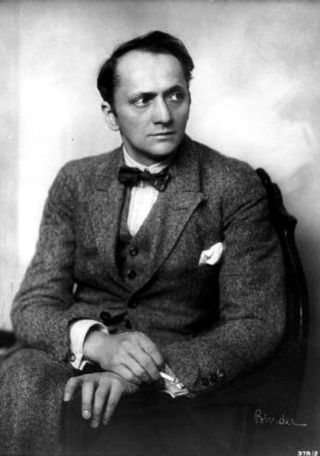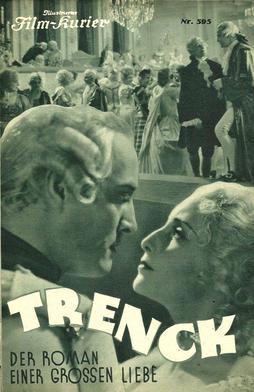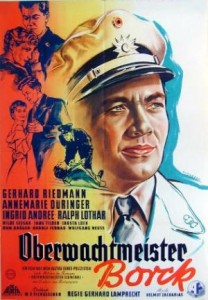The National Prize of the German Democratic Republic (East Germany) (German: Nationalpreis der Deutschen Demokratischen Republik) was an award of the German Democratic Republic (GDR) given out in three different classes for scientific, artistic, and other meritorious achievement. With scientific achievements, it was often given to entire research groups rather than individual scientists.

Theodor August Konrad Loos was a German actor.
The 36th Division was a unit of the Prussian/German Army. It was formed on April 1, 1890, and was headquartered in Danzig. The division was subordinated in peacetime to the XVII Army Corps. The division was disbanded in 1919 during the demobilization of the German Army after World War I. The division was recruited primarily in West Prussia.
Kabarett is satirical revue, a form of cabaret which was developed in France by Rodolphe Salis in 1881 as the cabaret artistique. It was named Le Chat Noir and was centered on political events and satire. It later inspired creation of Kabarett venues in Germany from 1901, with the creation of Berlin's Überbrettl venue and in Austria with the creation of the Jung-Wiener Theater zum lieben Augustin housed in the Theater an der Wien. By the Weimar era in the mid-1920s it was characterized by political satire and gallows humor. It shared the characteristic atmosphere of intimacy with the French cabaret from which it was imported, but the gallows humor was a distinct German aspect.

Robert and Bertram is a 1939 German musical comedy film directed by Hans H. Zerlett and starring Rudi Godden, Kurt Seifert, and Carla Rust. It premiered in Hamburg on 7 July 1939. It was based on the 1856 play Robert and Bertram by Gustav Räder about two wandering vagrants which had been adapted into several film versions including a Polish film of the same title the previous year. It was set in 1839.

Assassination is a 1927 German silent thriller film directed by Richard Oswald and starring Eduard Rothauser, Mathilde Sussin and Hans Stüwe. It was adapted from a novel by Vicki Baum. It was shot at the EFA Studios in Berlin. The film's art direction was by Gustav A. Knauer.

Trenck is a 1932 German historical film directed by Ernst Neubach and Heinz Paul starring Hans Stüwe, Dorothea Wieck, and Olga Chekhova. The film was based on a novel by Bruno Frank. It was shot at the Johannisthal Studios with sets designed by the art director Erich Czerwonski. It depicts the life of the Eighteenth century adventurer Friedrich von der Trenck.

Caroline Philippine von Briest was one of the most prolific German women writers of the Romantic period. She wrote novels, short stories, fairy tales, as well as essays, on Greek mythology, on the history of fashion, and travelogues. Her numerous works gained her a high degree of celebrity.

Sergeant Borck is a 1955 West German drama film directed by Gerhard Lamprecht and starring Gerhard Riedmann, Annemarie Düringer and Ingrid Andree. It is a remake of the 1935 film Sergeant Schwenke. It was shot at the Spandau Studios in West Berlin and on location in Hamburg. The film's sets were designed by the art directors Willi A. Herrmann and Heinrich Weidemann.

Five Suspects is a 1950 West German crime film directed by Kurt Hoffmann and starring Hans Nielsen, Dorothea Wieck and Friedrich Schoenfelder. It is also known by the alternative title of City in the Fog.

Liselotte of the Palatinate is a 1966 West German historical comedy film directed by Kurt Hoffmann and starring Heidelinde Weis, Harald Leipnitz and Karin Hübner. It portrays the marriage of the German princess Liselotte of the Palatinate to Philippe I, Duc d'Orléans the brother of Louis XIV and her adventures at the French court.

The Girl from Flanders is a 1956 romantic drama film directed by Helmut Käutner starring Nicole Berger, Maximilian Schell, and Viktor de Kowa. It is an adaption of the novel Engele von Löwen written by Carl Zuckmayer.
The Seeds of Life is a German silent drama film directed by Georg Jacoby and starring Emil Jannings, Hanna Ralph, and Hans Junkermann. It was released in three parts. The third part in the series was released as Moral und Sinnlichkeit.

Johannes Kepler is a 1974 East German historical drama film directed by Frank Vogel and starring Reimar J. Baur, Trude Bechmann and Kurt Böwe. It is a biopic of the German astronomer and mathematician Johannes Kepler.
This page is based on this
Wikipedia article Text is available under the
CC BY-SA 4.0 license; additional terms may apply.
Images, videos and audio are available under their respective licenses.









